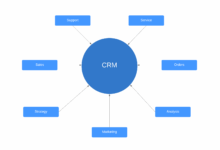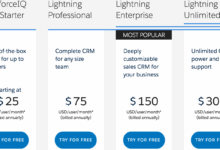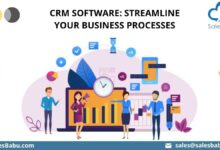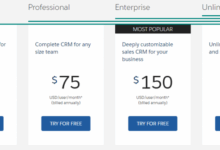CRM for Sales and Marketing Automation: Streamlining Success
CRM for Sales and Marketing Automation is a powerful tool that revolutionizes how businesses manage customer relationships and boost sales. Dive into the world of CRM systems and uncover the key to optimizing sales and marketing strategies.
Introduction to CRM for Sales and Marketing Automation
Customer Relationship Management (CRM) is a technology that helps businesses manage interactions with current and potential customers. In the context of sales and marketing automation, CRM plays a crucial role in organizing, automating, and synchronizing various sales and marketing activities.
CRM systems streamline sales and marketing processes by centralizing customer data, tracking interactions, and providing insights that enable targeted marketing campaigns and personalized sales efforts. By integrating CRM with automation tools, businesses can automate repetitive tasks, improve efficiency, and enhance customer engagement.
Benefits of using CRM for Sales and Marketing Automation
- Improved Customer Relationships: CRM systems help businesses build and maintain strong relationships with customers by providing a comprehensive view of customer data, preferences, and interactions.
- Increased Sales Productivity: By automating tasks such as lead scoring, email campaigns, and follow-ups, CRM systems enable sales teams to focus on high-priority leads and opportunities, ultimately boosting sales productivity.
- Enhanced Marketing Campaigns: With CRM data insights, marketing teams can create targeted campaigns, personalize messaging, and track campaign performance to optimize marketing strategies and drive better results.
- Efficient Data Management: CRM systems ensure data accuracy, consistency, and accessibility, enabling teams to make informed decisions, collaborate effectively, and maintain data integrity across the organization.
Key Features of CRM for Sales and Marketing Automation
Utilizing a CRM system for sales and marketing automation requires specific features to effectively streamline processes and enhance customer relationships.
Lead Management Integration
Lead management is a critical component integrated into CRM systems for sales and marketing purposes. This feature allows businesses to capture, track, and nurture leads throughout the sales funnel, ensuring no opportunity is missed.
Importance of Analytics and Reporting Capabilities
Analytics and reporting capabilities are essential in CRM systems to optimize sales and marketing strategies. By analyzing data on customer behavior, preferences, and interactions, businesses can make informed decisions to enhance their marketing campaigns and sales efforts.
Implementation of CRM in Sales and Marketing
Implementing a Customer Relationship Management (CRM) system for sales and marketing automation is a crucial step for businesses looking to streamline their processes and improve customer interactions. The implementation process involves careful planning, coordination, and integration to ensure a successful adoption of the CRM system.
Steps in Implementing a CRM System for Sales and Marketing Automation
- Define objectives and goals: Clearly outline what you aim to achieve with the CRM system, whether it’s improving lead generation, enhancing customer service, or increasing sales.
- Choose the right CRM software: Select a CRM platform that aligns with your business needs and budget constraints. Consider factors like scalability, customization options, and integration capabilities.
- Map out processes: Identify current sales and marketing processes to understand how the CRM system will fit into your existing workflow. Streamline and optimize processes for better efficiency.
- Train employees: Provide comprehensive training to employees on how to use the CRM system effectively. Encourage adoption and ensure everyone understands the benefits of the new system.
- Customize and configure: Tailor the CRM system to meet your specific requirements by customizing fields, workflows, reports, and dashboards to suit your business needs.
- Integrate with existing tools: Ensure seamless integration with other tools and systems used in sales and marketing to avoid data silos and improve data visibility.
- Monitor and evaluate: Continuously monitor the CRM system’s performance, gather feedback from users, and make necessary adjustments to optimize its functionality.
Common Challenges Faced During CRM Implementation and How to Overcome Them
- Lack of user adoption: Employees may resist using the new CRM system due to unfamiliarity or perceived complexities. Offer training sessions, provide ongoing support, and demonstrate the system’s benefits to encourage adoption.
- Data quality issues: Inaccurate or incomplete data can hinder the effectiveness of the CRM system. Implement data cleaning processes, establish data governance policies, and regularly audit data to ensure quality.
- Poor integration: Failure to integrate the CRM system with other tools and systems can lead to data inconsistencies and inefficiencies. Invest in robust integration solutions and work closely with IT teams to ensure a seamless integration process.
- Over-customization: Excessive customization of the CRM system can lead to complexity and usability issues. Strike a balance between customization and out-of-the-box functionality to avoid overburdening users.
Examples of Successful CRM Implementation in Sales and Marketing Scenarios
Successful CRM implementation can be seen in companies like Salesforce, HubSpot, and Zoho, where the CRM systems have revolutionized sales and marketing processes. These companies have effectively utilized CRM to improve lead management, customer communication, and sales forecasting, resulting in increased revenue and customer satisfaction.
Integration of CRM with Marketing Automation Tools
Integrating CRM with marketing automation tools is crucial for businesses looking to streamline their operations and improve overall efficiency. By combining these two powerful systems, companies can effectively manage customer relationships while automating marketing tasks to boost lead generation and conversions.
Significance of Integration
When CRM is integrated with marketing automation tools, it allows for a seamless flow of data between sales and marketing teams. This integration enables businesses to track customer interactions, preferences, and behaviors more effectively, leading to targeted marketing campaigns and personalized communication strategies.
Enhancing Lead Generation and Conversion
CRM and marketing automation tools work together to identify potential leads, nurture them through the sales funnel, and convert them into loyal customers. By analyzing customer data and behavior, businesses can create personalized marketing campaigns that resonate with their target audience, ultimately leading to higher conversion rates and increased sales.
Best Practices for Integration
- Ensure that both CRM and marketing automation platforms are compatible and can easily sync data.
- Define clear objectives and goals for the integration process to align sales and marketing efforts.
- Train employees on how to effectively use the integrated systems to maximize efficiency and productivity.
- Regularly monitor and analyze the performance of the integrated systems to make necessary adjustments and improvements.
Successful Integration Examples
Companies like Salesforce and HubSpot have successfully integrated CRM with marketing automation tools to streamline their processes, improve customer engagement, and drive revenue growth. These businesses have leveraged the combined power of CRM and marketing automation to deliver personalized experiences and targeted marketing campaigns that resonate with their audience.
Benefits of Integration vs. Separate Use
- Integrated systems provide a unified view of customer data, leading to more personalized communication and targeted marketing campaigns.
- Streamlined processes and automated workflows result in improved efficiency and productivity for sales and marketing teams.
- Using CRM and marketing automation tools separately may lead to data silos, duplication of efforts, and inconsistencies in customer communication.
Setting up Integration Guide
- Identify the key data points that need to be shared between CRM and marketing automation systems.
- Choose a reliable integration platform or tool that can facilitate seamless communication between the two systems.
- Map out the integration process, including data mapping, field matching, and testing procedures.
- Train employees on how to use the integrated systems effectively and troubleshoot any issues that may arise during the integration process.
Challenges and Pitfalls
Some challenges organizations may face when integrating CRM with marketing automation tools include data inconsistencies, compatibility issues between platforms, and resistance from employees to adopt new technologies. It is essential to address these challenges proactively and have a clear implementation strategy in place to ensure a successful integration.
Customization and Personalization in CRM for Sales and Marketing
Customization and personalization are crucial aspects of CRM systems for sales and marketing teams. Tailoring CRM to meet the specific needs of a business can greatly enhance customer interactions and boost sales effectiveness.
Importance of CRM Customization
Customizing CRM systems allows companies to adapt the software to their unique workflows and requirements. This personalization enables teams to work more efficiently, improve customer relationships, and drive better results.
- Creating tailored reports: Customizing CRM involves generating reports that provide relevant insights for sales and marketing teams. These reports can help identify trends, monitor performance, and make informed decisions.
- Setting up automated workflows: Customizing CRM with automated workflows streamlines processes, reduces manual tasks, and ensures consistency in customer interactions. Automation helps teams save time and focus on high-value activities.
- Integrating third-party tools: CRM customization often involves integrating third-party tools to extend functionality. These tools can enhance marketing campaigns, improve data management, and provide additional insights for decision-making.
Personalized Marketing Campaigns
CRM data can be leveraged to create personalized marketing campaigns that resonate with target audiences. By analyzing customer data within CRM, businesses can identify preferences, behavior patterns, and buying habits to tailor campaigns for maximum impact.
- Segmenting customer data: Customizing CRM allows for the segmentation of customer data based on demographics, purchase history, and interactions. This segmentation enables targeted marketing strategies that speak directly to specific customer segments.
- Personalized content creation: CRM customization facilitates the creation of personalized content that engages customers on a deeper level. By delivering relevant and timely content, businesses can drive customer engagement, loyalty, and conversions.
Data Management and Security in CRM Systems
Effective data management and security are crucial aspects of CRM systems for sales and marketing. Proper organization and protection of data ensure that businesses can make informed decisions and maintain customer trust.
Best Practices for Data Management in CRM
- Regularly clean and update data to remove duplicates and inaccuracies.
- Implement a standardized naming convention for consistency and ease of search.
- Segment data based on customer behavior, demographics, and preferences for targeted marketing.
- Integrate CRM with other systems to ensure data consistency across platforms.
Importance of Data Security Measures
- Encrypt sensitive customer information to prevent unauthorized access.
- Implement user authentication and access controls to restrict data access based on roles.
- Regularly conduct security audits and updates to identify and address vulnerabilities.
- Educate employees on data security best practices to prevent data breaches.
Maintaining Data Integrity in CRM Systems
- Use validation rules to ensure data entered meets predefined criteria.
- Regularly audit data for accuracy and completeness to avoid errors in analytics.
- Implement data backup and recovery processes to prevent data loss.
- Train employees on the importance of maintaining data integrity to improve overall CRM performance.
CRM Integration with E-commerce Platforms
Integrating CRM systems with e-commerce platforms can bring numerous benefits for sales and marketing automation. By seamlessly connecting customer data, purchase history, and interactions, businesses can enhance their understanding of customers and personalize their online shopping experience.
Improved Customer Engagement and Sales Drive
- CRM integration allows businesses to track customer behavior on e-commerce platforms, enabling targeted marketing campaigns based on individual preferences and purchase history.
- By analyzing data from both CRM and e-commerce platforms, businesses can identify trends, predict customer needs, and offer personalized recommendations to drive sales.
- Automated workflows triggered by CRM data can lead to timely follow-ups, abandoned cart reminders, and targeted promotions, increasing customer engagement and ultimately boosting sales.
Examples of Successful Integrations
- Amazon’s integration of CRM systems with their e-commerce platform enables personalized product recommendations based on browsing history and purchase behavior, leading to increased sales and customer loyalty.
- Salesforce’s CRM integration with Shopify allows businesses to streamline order management, customer communication, and marketing campaigns, resulting in improved operational efficiency and revenue growth.
- Zoho CRM integration with WooCommerce provides businesses with a 360-degree view of customer interactions, helping them tailor marketing strategies, optimize sales processes, and drive conversions in the online retail environment.
Mobile CRM for Sales and Marketing Automation
Mobile CRM applications have become essential tools for sales and marketing teams who are constantly on the move. These applications offer a wide range of advantages that can significantly enhance productivity and communication within organizations.
Advantages of Mobile CRM Applications
- Access to real-time data and information anytime, anywhere
- Improved collaboration and communication among team members
- Enhanced customer engagement through instant responses and updates
- Increased efficiency in managing sales and marketing activities on the go
Selecting the Right Mobile CRM Solution
- Consider the specific needs and requirements of your sales and marketing teams
- Evaluate the ease of use and compatibility with existing systems
- Look for features like offline access, data synchronization, and security measures
Key Features of Top Mobile CRM Applications
| CRM Application | Key Features |
|---|---|
| Salesforce Mobile | Real-time analytics, offline access, customizable dashboards |
| Zoho CRM Mobile | Lead management, sales forecasting, in-app calling |
| HubSpot Mobile App | Contact management, email tracking, deal management |
Integrating Mobile CRM with Existing Systems
- Ensure compatibility and data integration with CRM and marketing automation tools
- Train teams on how to use the mobile CRM effectively for seamless integration
- Monitor performance and gather feedback for continuous improvement
Challenges and Solutions for Implementing Mobile CRM
- Challenge: Resistance to change and adoption among employees
- Solution: Provide training, support, and incentives to encourage usage
- Challenge: Data security and privacy concerns with mobile access
- Solution: Implement encryption, authentication, and remote wipe features
Case Studies of Successful Mobile CRM Implementation
- Company A saw a 20% increase in sales productivity after implementing a mobile CRM solution
- Company B improved customer engagement by 30% through mobile CRM features and real-time updates
CRM Training and User Adoption
Training sales and marketing teams on how to effectively use CRM systems is crucial for maximizing the benefits of these tools. It ensures that all team members are on the same page, utilizing the system to its full potential, and ultimately driving business growth.
Strategies for User Adoption
- Start with clear communication about the benefits of CRM for both individual users and the team as a whole.
- Provide hands-on training sessions tailored to different user levels, from beginners to advanced users.
- Offer incentives or rewards for active participation and successful implementation of CRM practices.
Best Practices for Ongoing Training and Support
- Establish a regular schedule for refresher courses to keep users engaged and up-to-date with new features or updates.
- Create a knowledge base or resource center for users to access training materials, FAQs, and troubleshooting guides.
- Assign dedicated CRM champions within each team to provide ongoing support and guidance to their colleagues.
Challenges and Solutions
- Challenge: Resistance to change. Solution: Highlight the benefits of CRM adoption through success stories and real-life examples.
- Challenge: Lack of understanding. Solution: Provide comprehensive training materials and offer one-on-one coaching sessions for struggling users.
Measuring Effectiveness of Training Programs
- Implement regular assessments or quizzes to gauge user proficiency and identify areas for improvement.
- Track key performance indicators (KPIs) related to CRM usage, such as lead conversion rates or customer retention metrics.
Interactive Training Activities
- Role-playing exercises: Simulate real-life scenarios to practice using CRM tools in different sales and marketing situations.
- Case studies: Analyze past CRM successes or challenges to learn valuable lessons and best practices for future use.
AI and Automation in CRM for Sales and Marketing
Artificial intelligence (AI) has revolutionized customer relationship management (CRM) systems by automating various sales and marketing processes. This technology enables businesses to streamline their operations, increase efficiency, and provide personalized experiences to customers.
Benefits of Automation in CRM
- Improved lead scoring: AI-powered CRM systems can analyze customer data to identify high-value leads, prioritize them, and allocate resources effectively.
- Enhanced email campaigns: Automation tools can segment customers based on behavior and preferences, allowing businesses to send targeted and relevant emails for better engagement.
- Efficient customer service: AI chatbots can provide instant responses to customer inquiries, resolve issues promptly, and offer round-the-clock support.
Comparison between Traditional CRM and AI-powered CRM
- Efficiency: AI-powered CRM systems can handle large volumes of data and tasks much faster than traditional systems, reducing manual efforts and improving productivity.
- Effectiveness: AI algorithms can analyze customer interactions, predict future behavior, and suggest personalized recommendations, leading to higher conversion rates and customer satisfaction.
Utilization of Machine Learning in CRM
Machine learning algorithms in CRM analyze customer data patterns, preferences, and behaviors to generate insights for better decision-making and strategy formulation. By leveraging AI, businesses can optimize marketing campaigns, tailor product recommendations, and enhance the overall customer experience.
Enhancing Customer Engagement with AI
AI in CRM enables businesses to engage with customers in a more personalized and timely manner. For instance, AI-driven chatbots can offer product recommendations, answer queries, and provide support, leading to improved customer satisfaction and loyalty. Additionally, AI can help businesses identify cross-selling and upselling opportunities, increasing revenue and customer lifetime value.
CRM Success Metrics and KPIs
In the realm of sales and marketing automation, it is crucial to identify key performance indicators (KPIs) that effectively measure the success of CRM implementations. These metrics play a significant role in evaluating the impact of CRM systems on business outcomes, including ROI, customer retention, and sales growth.
Comparison of Leading CRM Platforms
When comparing leading CRM platforms, it is essential to consider various factors such as features, pricing, and scalability. Here is a detailed comparison of some of the top CRM solutions in the market:
| CRM Platform | Key Features | Pricing | Scalability |
|---|---|---|---|
| Salesforce | Extensive customization options, AI-powered insights | Varies based on package | Highly scalable for businesses of all sizes |
| HubSpot | All-in-one marketing, sales, and service hub | Free to start, paid plans available | Scalable for small to medium businesses |
| Zoho CRM | Integrates with Zoho suite, workflow automation | Affordable pricing tiers | Scalable for growing businesses |
Integration of CRM Data with Business Systems
Creating a comprehensive strategy for integrating CRM data with other business systems is essential for maintaining a seamless workflow. By connecting CRM data with tools such as marketing automation platforms, e-commerce systems, and analytics software, businesses can gain valuable insights and improve overall efficiency.
Ensuring data accuracy and consistency in CRM systems is paramount for informed decision-making processes.
Case Studies of Effective CRM Implementation
Implementing CRM for sales and marketing automation can yield significant benefits for businesses. Let’s explore some case studies of companies that have successfully leveraged CRM to improve their sales and marketing efficiency.
Company A: Streamlining Sales Processes
- Company A, a mid-sized software company, implemented a CRM system to streamline their sales processes.
- By centralizing customer data and automating follow-up tasks, the sales team was able to work more efficiently and effectively.
- As a result, Company A saw a 20% increase in sales productivity and a 15% boost in revenue within the first year of implementing CRM.
Company B: Enhancing Customer Engagement
- Company B, a retail chain, integrated CRM with their marketing automation tools to enhance customer engagement.
- By personalizing marketing campaigns based on customer data stored in the CRM system, Company B saw a 30% increase in customer retention rates.
- The ability to track customer interactions and preferences enabled the marketing team to deliver targeted messaging, resulting in a higher conversion rate.
Company C: Improving Data Analytics
- Company C, a manufacturing company, utilized CRM to improve their data analytics capabilities.
- By tracking customer interactions and purchase history, Company C gained valuable insights into customer behavior and preferences.
- This data-driven approach allowed Company C to tailor their marketing strategies, leading to a 25% increase in lead generation and a 10% growth in customer acquisition.
Future Trends in CRM for Sales and Marketing Automation
As technology continues to advance, the future of CRM for sales and marketing automation is poised for exciting developments. Businesses need to stay ahead of the curve by understanding and adapting to these upcoming trends.
Role of Predictive Analytics and Machine Learning
- Utilizing predictive analytics and machine learning algorithms in CRM systems can provide valuable insights for sales and marketing teams.
- These advanced capabilities can help in forecasting customer behavior, identifying trends, and optimizing marketing campaigns for better results.
Benefits of Integrating Chatbots and AI Assistants
- Integrating chatbots or AI assistants within CRM systems enhances customer interactions by providing instant support and personalized recommendations.
- Automation of routine tasks through AI can streamline sales processes and improve overall efficiency.
Importance of Personalized Marketing Strategies
- Personalized marketing strategies driven by CRM data play a crucial role in customer retention and loyalty.
- By tailoring marketing messages based on customer preferences and behaviors, businesses can create more meaningful connections with their audience.
Comparison of CRM Platforms
- There are various CRM platforms available in the market, each offering unique features suited for different business sizes and industries.
- Businesses should evaluate the strengths and weaknesses of different CRM solutions to choose the one that best aligns with their specific needs and objectives.
Last Word
In conclusion, CRM for Sales and Marketing Automation offers a seamless way to enhance customer interactions, drive sales, and stay ahead in the competitive landscape. Embrace the power of CRM to unlock your business’s full potential.



